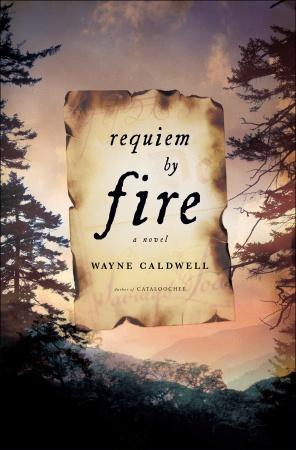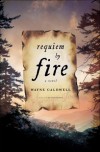On the heels of his 2007 novel, Cataloochee, local author Wayne Calwell returns with a new work of historical fiction. Requiem by Fire (Random House, 2010) revisits to the same corner of Appalachia; the community of Cataloochee which was absorbed by the Great Smoky Mountains National Park — that park was dedicated by President Roosevelt in 1941.
Requiem, spanning the years 1928-1935, tells of the period leading up to the park dedication during which the residents of the land, many whom had lived there for generations, were faced with the choice of selling their land and moving away for good, or selling their land and remaining for the lifetime of the landowner — but under government-imposed restrictions.
“For example, one could not break new ground,” young lawyer and outsider Oliver Babcock explains to a group of residents. “One would have to abide
by hunting and fishing regulations. Seasons, bag limits, bait restrictions, that kind of thing.” The mountain people are also not permitted to pasture their animals in certain areas, and even access to family cemeteries is in question — a matter that seems to disturb the Cataloochee natives more than anything else.
“That settles it,” Aunt Mary — the widow of Hiram Carter who appeared in Cataloochee — says to her son. “I’m not moving any farther from your papa. If I did, they might change their minds and not let you bring me back.”
But even as the Cataloochee residents struggle to decide whether they’ll stay or move away from their homes, life goes on. Oliver, originally from the Carolina coast, falls in love with and marries mountain woman Velda. The two leave the mountains, but Velda’s letters home bring glimpses of the modern world in to the mountains.
Jim Hawkins, after marrying his sweetheart Nell, takes a job with the Parks Commission and moves his young family deep into the wilderness. Nell, whose mother is snob, is quickly unhappy being so far away from “civilization” and soon pressures Jim to choose between his career and his family.
Old-timer Silas Wright — a central figure in the book — has no plans to leave his home and, in fact, considers suing the government over what he considers an unfair price for his land. Silas also has no intention of minding the government’s restrictions on fishing and hunting and carries on as usual. But Silas’ story is also one of old ways giving way to new: cars replace horses, wringer washers replace washboards and city life threatens rural ways.
Caldwell weaves all of these stories — and more — into an engaging text. Part journal of daily life in a time now long gone, part thriller (someone is setting fires around Cataloochee; Willie McPeters seems to be losing his senses), Requiem makes excellent work of describing both mountain life and the characters who lived in WNC during the early 1930s.
At times, Caldwell (who is obviously dedicated to research and detail) gets so caught up in depicting the place and time, that parts of his text read like product placements. “My wringer washing machine almost makes it fun to do diapers — sure beats boiling them in a kettle outside — and our radio ricks up the farthest stations at night,” Nell writes. “We both like WWVA in West Virginia.” But Caldwell’s mastery of dialect, scenery and the minutia of daily life is impressive. Most of all, he allows his characters to bring home to stark injustice of their predicament. After all, the making of the park was for the greatest good of the most American people, but for those who once called it home, the park spelled utter loss of all they held dear.
Wayne Caldwell’s Requiem by Fire is released on Monday, March 1. He’ll read and sign copies at the following locations:
• Blue Ridge Osondu Books & Cafe (152 S. Main St., Waynesville, 456-6000) on Saturday, Feb. 27, 1 p.m.
• Malaprop’s (55 Haywood St., Asheville, 254-6734) on Saturday, Feb. 27, 7 p.m.
• Accent on Books holds a launch party at First Baptist Church (5 Oak St., Asheville, 252-6255), 7 p.m.
• Fireside Books (Tri-City Mall, 74A Bypass, Forest City, 245-5188) on Friday, March 19, 5 p.m.
• City Lights Bookstore (3 Jackson St., Sylva, 586-9499) on Saturday, March 27 at 7 p.m.
—Alli Marshall, A&E reporter





The park service did a good thing when they saved several of the homes and buildings of the Cataloochee residents. That bond of people with the land is an important part of history to remember and learn from. The human history of Cataloochee had a much stronger impact on me when I went there than the wild beauty it also contains. I think I will need to go buy me a book.
An audio interview with Caldwell is here: http://www.authorlink.com/articles/item/770